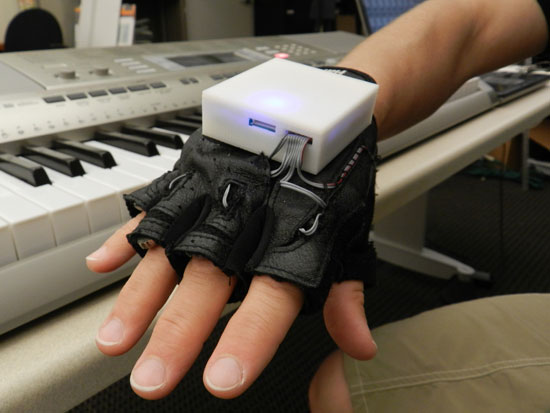Georgia Tech’s Mobile Music Touch is a vibrating glove that does not only help patients with spinal cord injuries regain sensory perception, but it can also teach people how to play the piano.
This concept has been developed mainly by Tanya Markow of Georgia Tech in collaboration with Thad Starner, a researcher from the Contextual Computing Group of the same institute. It is more than fascinating that they managed to create a product that can be used in fields that are that apart. The device includes a glove, a control box, which is visible in the following picture, and five vibrating motors, each corresponding to a finger. The vibration has a double effect, depending on the way the glove is used. First of all, vibrations are known to have a restorative effect on people who lost feeling in their hands as a result of spinal cord injuries.

The use of Mobile Music Touch as a learning aid for people who want to take piano lessons in an unusual way also implies a special keyboard whose keys light up according to the notes that are played. When a certain key lights up, the motor corresponding to the finger that should touch that key starts vibrating. This way, people are able to learn easier. It surely would be interesting to see this device paired with other musical instruments. Without trying to exaggerate, I think this device has the potential of revolutionizing the way people learn to play music.
As for the patients with sensory problems, Tanya Markow said that “Some people were able to pick up objects more easily. Another said he could immediately feel the heat from a cup of coffee, rather than after a delay.” In addition, Thad Starner declared: “Equipment used for hand rehabilitation may seem monotonous and boring to some, and doesn’t provide any feedback or incentive, […] Mobile Music Touch overcomes each of those challenges and provides surprising benefits for people with weakness and sensory loss due to SCI (spinal cord injury). It’s a great example of how wearable computing can change people’s lives.”
The development of this device does not stop here. Tanya Markow and Thad Starner plan to include MRI scans in their research, so that they understand better how the device helps people with diminished sensory perception.
If you liked this post, please check the Medical Diagnostic Glove and the Texting Glove, which was modified for the hearing impaired.










